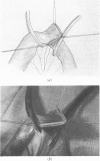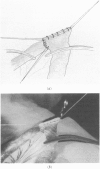Abstract
Laparotomy and anastomosis of the small bowel after penetrating injury to the abdomen is a lengthy procedure. This paper describes the use of skin staplers for bowel anastomosis and presents the results of a short series of experiments upon dead pigs to compare the staple technique with conventional handsewn anastomosis. The time taken to perform each small bowel anastomosis, the integrity of the anastomosis and the skill required were assessed. The staple technique was considerably faster (mean construction time: 5.4 min, range 4-6 min) than the handsewn technique (mean construction time: 12 min, range 10-14 min), at least halving the anastomosis time (Kolmogorov two-sample test P = 0.05). In addition, the stapled anastomosis had a higher intraluminal failure pressure (mean failure pressure: 65 cmH2O, 6.37 kPa, range 30-70 cmH2O) than the handsewn anastomosis (mean failure pressure: 38.6 cmH2O, 3.78 kPa, range 10-70 cmH2O).
Full text
PDF



Images in this article
Selected References
These references are in PubMed. This may not be the complete list of references from this article.
- Getzen L. C., Simmons R. D., Kendall L. W. A critical review of 83 penetrating abdominal visceral injuries. Mil Med. 1972 May;137(5):173–180. [PubMed] [Google Scholar]
- Gilbert J. M., Trapnell J. E. Intraoperative testing of the integrity of left-sided colorectal anastomoses: a technique of value to the surgeon in training. Ann R Coll Surg Engl. 1988 May;70(3):158–160. [PMC free article] [PubMed] [Google Scholar]
- Lockwood A. L., Kennedy C. M., Macfie R. B., Charles S. F. Observations ON THE TREATMENT OF GUNSHOT WOUNDS OF THE ABDOMEN: WITH A SUMMARY OF 500 CASES SEEN IN AN ADVANCED CASUALTY CLEARING STATION. Br Med J. 1917 Mar 10;1(2932):317–320. doi: 10.1136/bmj.1.2932.317. [DOI] [PMC free article] [PubMed] [Google Scholar]
- Schantz B. Aspects on the choice of experimental animals when reproducing missile trauma. Acta Chir Scand Suppl. 1979;489:121–130. [PubMed] [Google Scholar]






